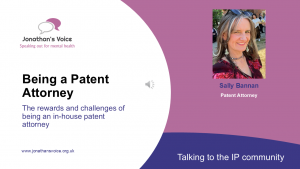IP Inclusive recently piloted a training course, kindly hosted by CIPA at their offices, for those from the IP professions who wished to train as Mental Health First Aiders. It was a two-day course run by a trainer from Mental Health First Aid England.
Jonathan’s Voice was pleased to sponsor Andrea Brewster, IP (Intellectual Property) Inclusive leader, with whom the charity works very closely. Below is an extract from her blog which reflects her very positive experience.
“On 26 and 27 June I was lucky enough to attend a Mental Health First Aid (MHFA) training course at CIPA’s offices on Holborn. My place had been very kindly sponsored by the mental health charity Jonathan’s Voice, with the idea that having experienced the training first-hand, I would be better placed to encourage other IP Inclusive supporters to try it.
There were 14 delegates on our course. They included IP attorneys and paralegals, HR professionals, an IP Office examiner and members of the CIPA team, with representatives from both private practice and industry. All were keen to get involved in the discussions and to share their own experiences, often with a great deal of courage and candour. These personal stories were by no means obligatory, but in our case they made the training so much more powerful, helping us to make sense of the things we were being taught.
Our trainer meanwhile, from Mental Health First Aid England, was gentle, approachable and an excellent listener. She encouraged us to find answers for ourselves and to share ideas and perspectives.
It was a pretty intensive course. We learnt a lot. We also came away with a manual full of information about different forms of mental illness and sources of guidance and support. Over the course of the two days, we covered a whole range of problems from anxiety and depression through to psychoses and personality disorders, with a particular focus on how to recognise and help with crisis situations, for instance if somebody is contemplating suicide.
We were taught a simple five-step plan for dealing with the scenarios we might come across “at the coal face”. Importantly, we also learned about the limits to what we could be expected to do. Mental health first aid is a kind of “triage” process, just like physical first aid: our aim is to get people out of danger and then to help them find the right source of professional help. We can’t offer treatment; that’s not what we’re there for. But we can listen, support and signpost.
A key part of the training was about the symptoms to look out for, the signs – some obvious, some less so – that someone is struggling. For me these were huge wake-up calls. I realised that instead of dismissing somebody as moody or irritable, slow or slipshod, uncommitted or inattentive, or just plain difficult, we should perhaps be thinking about whether their behaviour is a sign of something more serious, a hint that they need our concern not our criticism.
With that awareness came a greater empathy. And a realisation that mental ill-health really is all around us, all the time, and that we need to be more open about it so that we can support one another through the difficult times that pretty much all of us will face at some point in our lives.
And that brings me to another important part of the training: how to approach someone you think might be suffering; how to be a good listener – and I mean proper listening, without judgement, without interruption, with kindness and respect. The course gave us the skills, the vocabulary and the courage to get meaningful conversations going, as well as the incentive for doing that. This, together with the reference manual, gave us more confidence to approach colleagues and help them reach out for the support they need, even in a crisis. A series of case studies, discussed in groups throughout the two days, helped us build on the approaches we’d learned.
Another valuable outcome from MHFA training is the ability to recognise the signs of trouble in your own mental health. And, of course, the reassurance that you are not alone, you are not a freak, there is help available and there are people willing to guide you towards it.
Was the training useful? You bet it was. Perhaps most important of all was that it encouraged conversations. After two days immersed in the subject, mental ill-health no longer seemed such a taboo subject. By the end we were all talking freely about something that’s normally swept under the carpet. That felt liberating. Comforting, too.
When you go back to the workplace with these skills, I guarantee you will be able to start eroding some of the stigma around mental illness and create a happier, healthier and more honest workplace.
When you go back to the workplace with these skills, I guarantee you will be able to start eroding some of the stigma around mental illness and create a happier, healthier and more honest workplace. Yes, there needs to be follow-up, for example to let people know you’re there and how you can help, and of course to establish ground rules with your employer about how your new role fits into your existing workload. I would suggest that an informal in-house event might be useful, to explain to colleagues what a mental health first aider can do and to encourage them to make use of the new support that’s available”.
You can read Andrea’s full report here https://ipinclusive.org.uk/newsandfeatures/mental-health-first-aid-pilot-a-report/









